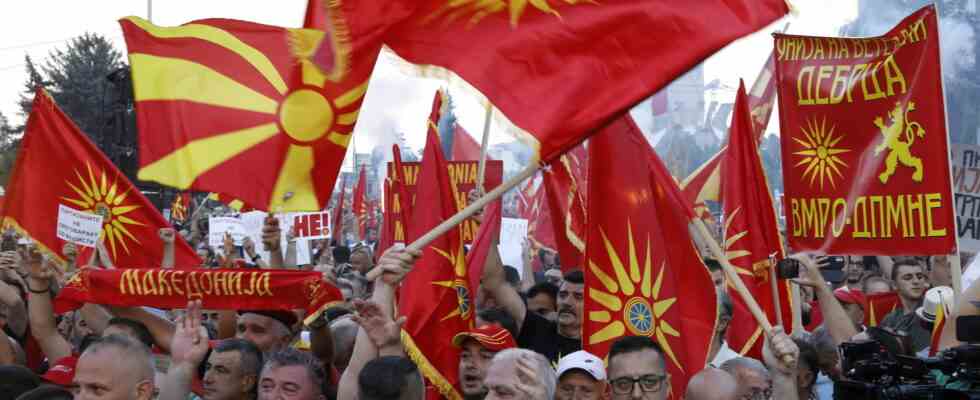Status: 07/03/2022 11:31 a.m
In the dispute over EU accession negotiations, Bulgaria insists on strengthening the rights of the minority in North Macedonia. The demands go too far for many in North Macedonia. Thousands protested in Skopje.
Thousands of people in North Macedonia have protested against concessions to Bulgaria intended to pave the way for EU accession talks with the south-eastern European country. People gathered in the capital, Skopje, waving North Macedonian flags, holding up placards that read “No to the EU” and shouting anti-government slogans. The protests were supported by the right-wing conservative opposition party VMRO-DPMNE and other opposition groups.
France proposes constitutional amendment
On Friday, the North Macedonian government presented a new plan that France had drawn up during its EU Council Presidency, which ended on Thursday. According to the compromise proposal, North Macedonia would have to change its constitution, among other things, to guarantee the rights of the Bulgarian minority.
“We don’t need Europe if we are to be assimilated,” opposition leader Hristijan Mickoski told the demonstrators. “I don’t want to belong to Europe because I have the right to be a Macedonian who speaks the Macedonian language and fights for his identity and culture.”
Name change paved way to NATO
North Macedonia has been a candidate for EU membership for 17 years. The country was given the green light to start accession talks in 2020, but no date has yet been set for the start of negotiations. The country even changed its name in 2019 – previously it was called “Macedonia” – to resolve a conflict with EU member Greece over a region of the same name. A year later, this paved the way for North Macedonia to join NATO.
Bulgaria makes numerous demands
Bulgaria has opposed official EU accession talks with North Macedonia since 2020. The government in Sofia is demanding that North Macedonia recognize Bulgarian roots in its language, population and history. The alleged discrimination against the Bulgarian minority in North Macedonia has also been criticized. In a six-page memorandum, historical injustices from the 1930s and 1940s are accounted for. The paper is full of blame and demands.
In order to withdraw the veto, Bulgaria finally wanted Bulgarians to enjoy the same rights as others in North Macedonia by being enshrined in the constitution as a people. In addition, Bulgaria does not want to recognize a “Macedonian language” as an independent language – from the Bulgarian point of view it is a form of the Bulgarian language. It insists that EU institutions are monitoring whether North Macedonia implements a bilateral good-neighborhood treaty signed in 2017. This regulates, among other things, how to deal with the partly shared history.
North Macedonia’s Foreign Minister Bujar Osmani was still skeptical at the end of June: “It doesn’t matter what the final version of an agreement will be like. Bulgaria can still find millions of reasons to block the talks.”
Baerbock pushes for accession talks
Federal Foreign Minister Annalena Baerbock put pressure on Friday in the discussion about closer rapprochement between the Western Balkan countries and the European Union. “There must be no niche in the Balkans for Russia or other actors to get stuck in,” added Baerbock.
The EU should have kept its promise to open accession negotiations with a view to the Western Balkans and especially North Macedonia and Albania long ago, said the minister. “It is in our own strategic interest and it is also a question of credibility.” The Western Balkans include Albania, Bosnia-Herzegovina, Kosovo, North Macedonia, Montenegro and Serbia.
In this context, Baerbock emphasized the compromise proposed by France. The compromise proposal is a unique opportunity. “We must now finally take this step together,” said the minister. If you don’t keep promises, the gaps will be filled by others. Many young people in particular are disappointed, whose hope is the “common European house”.
With information from Wolfgang Vichtl, ARD Studio Vienna

